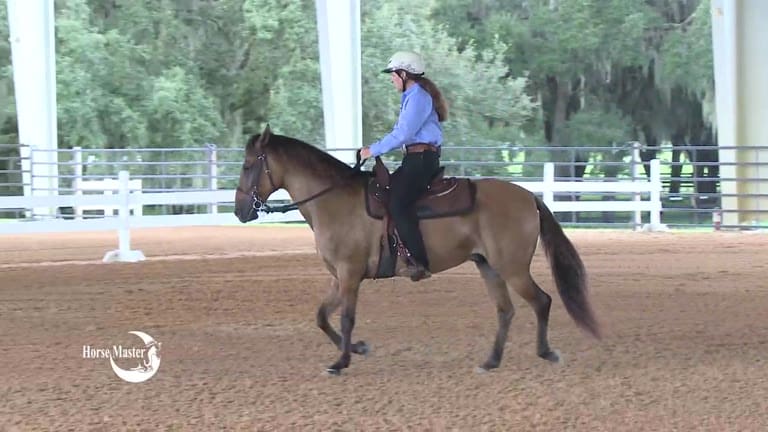Question: Hello Julie,
I am looking at buying a Tennessee Walker. With my current horse, I am finding it a challenge to post. I’m 48 years old. I purchased your DVDs and they were helpful, but I’m just not really comfortable with posting and like the idea of a smooth ride on a gaited horse. I have heard you don’t have to post with a gaited horse, do you think I would be happier with a gaited horse? Anything I should consider? Any help would be appreciated.
Regina
Answer: Dear Regina,
The popularity of gaited horses has drastically increased lately. There seems to be a correlation of interest along with the age of the largest recreational riding market: the Baby Boomers. At 51 years old, I am at the very bottom of this generation and beginning to feel the normal aches and pains of growing older. Thankfully, I am also benefiting from the wisdom and experience that comes with the territory and I wouldn’t trade that for a younger body (as long as there’s a plentiful supply of CosaminASU )!
Naturally as we age, we experience the back aches and joint pain that comes with the territory and the appeal of a gaited horse is that he is often smoother than a regular horse and his movements have little suspension (which occurs when all four of the horse’s feet come off the ground at the same time, like in the trot and canter); that’s why you don’t have to post. Also, many people are getting into riding for the first time at this age, or coming back to riding after several decades or more and the gaited horse can be easier to ride because the gaits may be smoother and the horses are often narrower, which also increases comfort for the rider.
Gaited horses come in all shapes, sizes and colors and there are a variety of breeds with varying abilities and temperaments. The Tennessee Walker, Missouri Foxtrotter and Saddlebred are perhaps the most well known gaited breeds, but with the increased popularity of the “novelty” breeds today, we have many other gaited breeds to choose from such as Peruvian Paso, Paso Fino, Mountain Horses (Kentucky and Rocky Mountain), Icelandics, Mangalarga Marchador, and others. Each breed is distinct for its size, temperament and purpose, so it is worthwhile investigating your various options to see what the best fit is for you.
Some things to consider: First, just like naturally gaited horses, some are smooth gaited and some are not; there is not a guarantee that all gaited horses are smooth. I have ridden gaited horses that are just as rough as a regular horse and I have ridden regular horses that are as easy as the smoothest gaited horse. But in general, gaited horses will be smoother.
Also, just because a horse is bred to be gaited doesn’t mean that he is “set” in his gaits; it does not come automatically to all gaited horses. To some horses it is more natural than others and some will need professional training to get the horse to gait steadily and correctly. Sometimes the horse has to be supported by the rider to maintain his gait and that requires a certain level of skill, knowledge and effort on the part of the rider. It is best to find a horse that is naturally set in his gaits and will maintain them without the aid of the rider or need help from a trainer.
It can be a challenge to find a mature, well-trained gaited mount. I have searched for gaited horses for my horse sales program, knowing that many of my clientele would prefer a gaited horse. Since my promise is to have only mature, safe and reliable horses that are great for trail and arena, and for any level of rider, I’ve noticed that because of their size and popularity it can be difficult to find one that meets all my criteria. That said, I recently had a gaited horse in my program that was a jewel to ride. He was smooth and well trained, very experienced and fun to ride around the ranch. There are great horses like that out there—just be sure to test ride a few so you know the difference and can feel a great smooth and reliable ride. I prefer horses that are mature, well-trained and have ‘been there and done that.’ Regardless of whether it’s a gaited horse or not, I’d hate to see you make the mistake of buying a young green horse.
Although I enjoy riding gaited horses on occasion, my personal preference is for a naturally gaited horse. I enjoy the gaits of trot and canter and with my love of versatility ranch horse competitions and cow work, I find a stock-bred horse has the athleticism for that genre.
If your interests lie entirely in going down the trail or even endurance, it is hard to beat a gaited horse that is set in his gaits, well-trained and well-tempered. My preference would be either a Foxtrotter or a Mountain Horse. I like their size and temperament a lot. Also, there is a line of Tennessee Walkers that have been bred in Wyoming exclusively for trail (no show blood lines). I have worked with a few of these horses and they are awesome.
A side note on posting…. Posting can be one of the most challenging things to learn in riding, but once you get it, posting is really easy. Remember you have to use the motion of the horse to push you up and out of the saddle—like you are bouncing your bottom on a trampoline. Once you get the movement and the rhythm, it should be fairly effortless.
If you are interested in gaited horses, I would recommend a clinician named Elizabeth Graves http://www.lizgraves.com. She is a renowned expert on all gaited breeds and her approach is very holistic and humane; if you have a chance to see her at a clinic or an expo, you’ll be glad you did. It is by no means unique to the gaited breeds, but there are many gaited trainers that employ harsh ”old-school” techniques to get the gaited movements that became popular in the show ring.
Good luck in your search and I hope you find your dream horse!
JG
Copyright ©Julie Goodnight 2000. All Rights Reserved. No part of this website may be reproduced without owner’s express consent.

